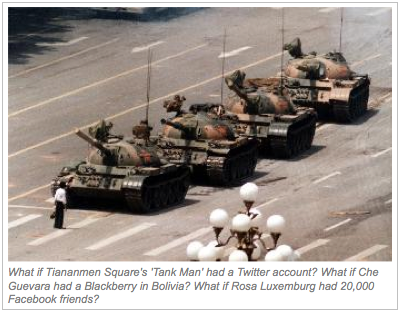By Dennis Baron
Western observers have been celebrating the role of Twitter, Facebook, smartphones, and the internet in general in facilitating the overthrow of President Hosni Mubarak in Egypt last week. An Egyptian Google employee, imprisoned for rallying the opposition on Facebook, even became for a time a hero of the insurgency. The Twitter Revolution was similarly credited with fostering the earlier ousting of Tunisia’s Ben Ali, and supporting Iran’s green protests last year, and it’s been instrumental in other outbreaks of resistance in a variety of totalitarian states across the globe. If only Twitter had been around for Tiananmen Square, enthusiasts retweeted one another. Not bad for a site that started as a way to tell your friends what you had for breakfast.
 But skeptics point out that the crowds in Cairo’s Tahrir Square continued to grow during the five days that the Mubarak government shut down the internet; that only nineteen percent of Tunisians have online access; that while the Iran protests may have been tweeted round the world, there were few Twitter users actually in-country; and that although Americans can’t seem to survive without the constant stimulus of digital multitasking, much of the rest of the world barely notices when the cable is down, being preoccupied instead with raising literacy rates, fighting famine and disease, and finding clean water, not to mention a source of electricity that works for more than an hour every day or two.
But skeptics point out that the crowds in Cairo’s Tahrir Square continued to grow during the five days that the Mubarak government shut down the internet; that only nineteen percent of Tunisians have online access; that while the Iran protests may have been tweeted round the world, there were few Twitter users actually in-country; and that although Americans can’t seem to survive without the constant stimulus of digital multitasking, much of the rest of the world barely notices when the cable is down, being preoccupied instead with raising literacy rates, fighting famine and disease, and finding clean water, not to mention a source of electricity that works for more than an hour every day or two.
It’s true that the internet connects people, and it’s become an unbeatable source of information—the Egyptian revolution was up on Wikipedia faster than you could say Wolf Blitzer. The telephone also connected and informed faster than anything before it, and before the telephone the printing press was the agent of rapid-fire change. All these technologies can foment revolution, but they can also be used to suppress dissent.
 You don’t have to master the laws of physics to observe that for every revolutionary manifesto there’s an equal and opposite volley of government propaganda. For every eye-opening book there’s an index librorum prohibitorum—an official do-not-read list—or worse yet, a bonfire. For every phone tree organizing a protest rally there’s a warrantless wiretap waiting to throw the rally-goers in jail. And for every revolutionary internet site there’s a firewall, or in the case of Egypt, a switch that shuts it all down. Cuba is a country well-known for blocking digital access, but responding to events in Egypt and the small but scary collection of island bloggers, El Lider’s government is sponsoring a dot gov rebuttal, a cadre of official counterbloggers spreading the party line to the still small number of Cubans able to get online—about ten percent can access the official government-controlled ’net—or get a cell phone signal in their ’55 Chevys.
You don’t have to master the laws of physics to observe that for every revolutionary manifesto there’s an equal and opposite volley of government propaganda. For every eye-opening book there’s an index librorum prohibitorum—an official do-not-read list—or worse yet, a bonfire. For every phone tree organizing a protest rally there’s a warrantless wiretap waiting to throw the rally-goers in jail. And for every revolutionary internet site there’s a firewall, or in the case of Egypt, a switch that shuts it all down. Cuba is a country well-known for blocking digital access, but responding to events in Egypt and the small but scary collection of island bloggers, El Lider’s government is sponsoring a dot gov rebuttal, a cadre of official counterbloggers spreading the party line to the still small number of Cubans able to get online—about ten percent can access the official government-controlled ’net—or get a cell phone signal in their ’55 Chevys.
All new means of communication bring with them an irrepressible excitement as they expand literacy and open up new knowledge, but in certain quarters they also spark fear and distrust. At the very least, civil and religious authorities start insisting on an imprimatur—literally, a permission to print—to license communication and censor content, channeling it al


